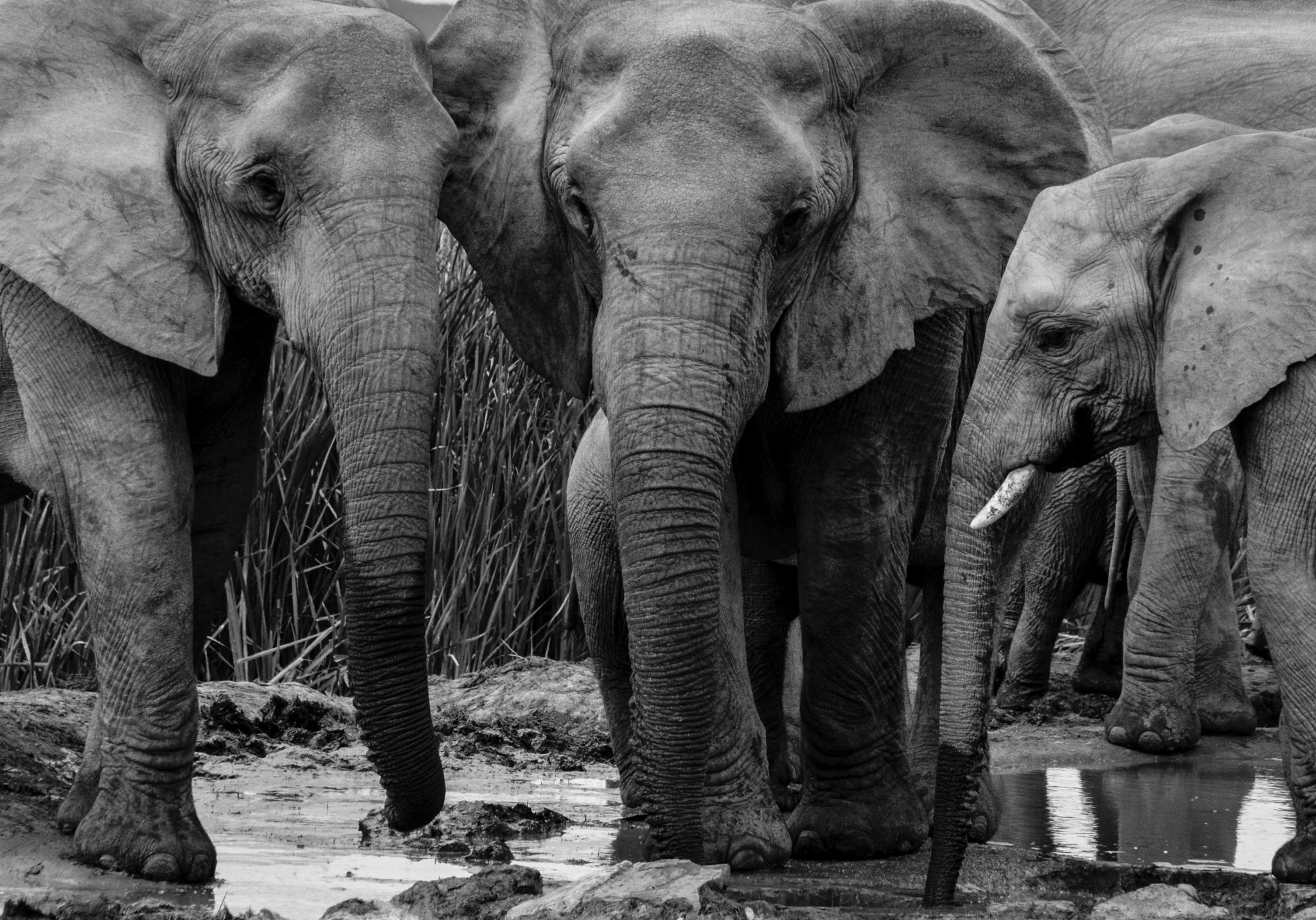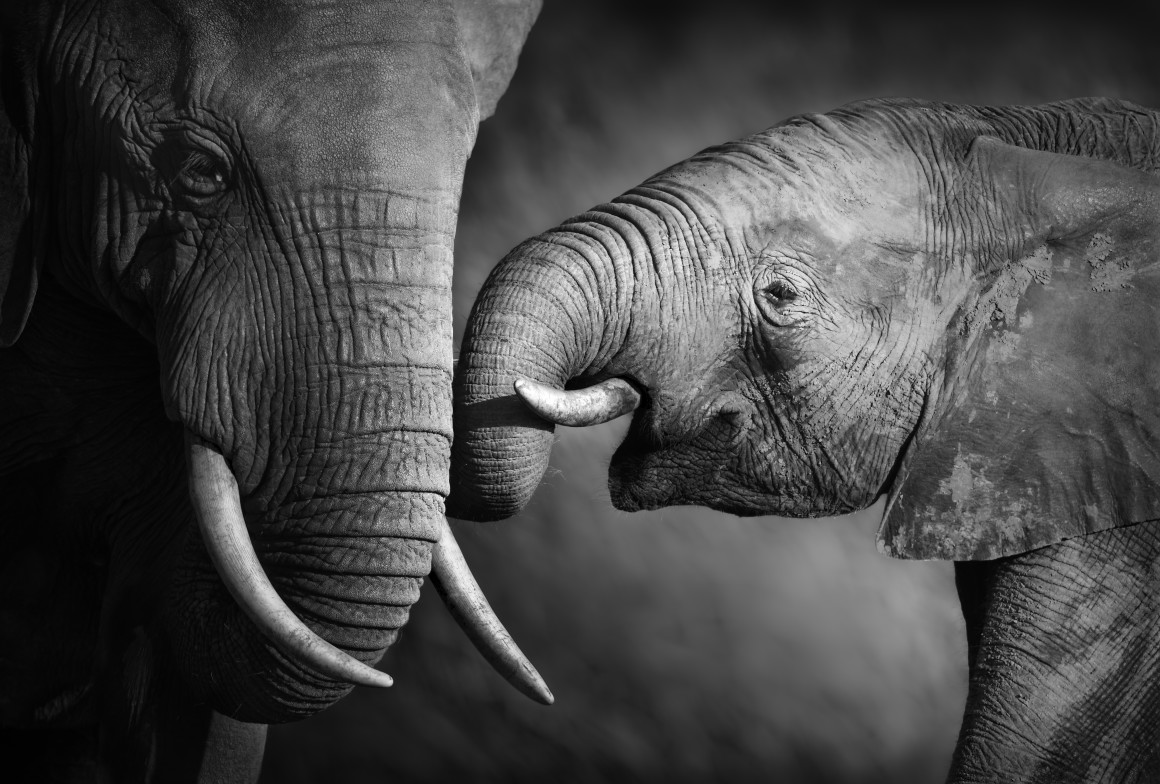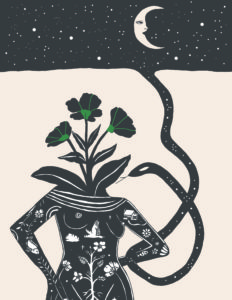In July 2015, Rosemary Alles left her high-paying job with NASA’s SOFIA mission and began the process of leaving behind her San Francisco home and giving away her possessions. She’s moving to South Africa to advocate for elephants, in order to give everything she can to these beautiful creatures.
Why such a drastic move?
Depending on whose numbers you go by, there are only 200,000 to 400,000 African elephants left. An elephant is killed for its tusk every 15 minutes. The stakes are very high—if things don’t change radically, we may only have 10 to 20 years before the African elephants are gone forever.

“When I found out that the poaching crisis had come back, it was shocking to me. I couldn’t believe it,” Rosemary says. She started researching the issue voraciously and discovered the incredible complexity of the situation—a mix of corruption in the countries where elephants live, a lack of legal ramifications for ivory trade, and very high consumer demand for ivory, in many cases from people who are simply unaware of the situation.
She soon realized that raising awareness was essential for the rapid change needed to protect the elephants. So in 2013 Rosemary co-founded the Global March for Elephants and Rhinos, which promotes awareness around the elephant crisis. The Global March was inspired by the first Kenyans United Against Poaching and David Sheldrick Wildlife Trust marches, both in Kenya and globally in 2013. The upcoming Global March on October 3 and 4 will be happening for the second year, with marches in 132 countries.
“It’s peaceful, effective, non-violent. It has a deep spiritual core to it,” she says. “I am of the mind that you do it in a way where the other person is not vilified but you raise a flag about behavior—in a passionate, relentless, and respectful way. I think until we do this, we won’t make a real change about either climate change or animal extinction.”
While Rosemary was raised to be socially conscious (her father also quit his good job to start an NGO), she wasn’t always so aware of elephant welfare. Growing up in her native Sri Lanka, Rosemary loved elephants but didn’t realize how they were treated. An encounter with an activist in the U.S. suddenly changed that. “This advocate pointed out what happens to elephants: They’re often kidnapped from their families in the wild and put through something called the ‘crush,’ which is a small enclosure where the baby elephant is trapped and ‘trained,’ but it’s really a process of torture to subdue this big animal—that psychological kind of space where you are beholden to this figure of authority but it’s this same person that feeds you and washes you. That’s ugly.” But if submissive elephants define the cultural norm, then it’s easy to never question how they got that way in the first place.
That perspective shift led Rosemary into a deeper practice of compassion for others’ worldviews—something that is at the core of her activism. “People use that card a lot—‘Don’t tell me about my culture’—but it’s important to listen to others, because the problems we have we can’t see but others can.” When Rosemary learned of the poaching crisis, she knew she had to take action while practicing compassion for everyone involved. The Global March came out of this intention.
Raising public awareness has proven successful in the past. You might remember the strong effort to stop elephant poaching back in the ’80s. At that time, the largest consumers of ivory were Western markets. Consumers were largely unaware that the elephant was killed for its tusk. People thought tusks were like fingernails that fell off and regrew. They didn’t know that elephants were brutally murdered for them, leaving herds of these emotionally intelligent animals in grief and chaos.

Thanks to the efforts of dedicated advocates, conservationists, and policy makers, public awareness grew, demand for ivory decreased, and in 1989 the Convention on International Trade in Endangered Species of Wild Fauna and Flaura (CITES) placed an international ban on the trade of ivory. Essentially, the member countries mutually agreed not to trade internationally, operating on an honor system without any real measures for enforcement. In the years following, with a combination of lower consumer demand plus the ban on trade, elephant poaching abated significantly.
So what has changed? How is it that the poaching situation “came back” to the extent that an elephant is now killed every 15 minutes?
In many of the African countries where both savanna and forest elephants live, there is immense economic disadvantage and significant corruption. Elephants and their tusks are extremely valuable. Forest elephants in particular are sought after because their tusks are longer and pinkish hued, making them more valuable in Chinese culture. They also live in some of the more politically unstable countries, putting them at even greater risk, perhaps with only 5 to 10 years left before extinction.
When a person finds an elephant in the bush that died of natural causes, in many cases they’re required to bring the tusks under their government’s control. The governments keep it, winding up with a stockpile of highly valuable ivory. Because there is such severe poverty, African countries often lobby to relax the ban on trade to bring in some money.
“Unfortunately, in 2008 they relaxed it for what they called a one-off sale. The door was open and then shut again,” Rosemary says. That legally sold stockpile went to China and Japan. “China was this burgeoning country with more money to spend, here comes all this ivory, and people went crazy. It’s like new cars in the United States—it’s a status symbol.” And, like the West in the ’80s, Rosemary says, “Many of the Chinese people don’t know that elephants have to be killed for the tusks to be taken off—they think they fall off like fingernails.” In a 2007 survey by the International Fund for Animal Welfare, 70 percent of the Chinese people polled said they were unaware that tusks were taken from dead elephants.
The increased demand, lack of awareness, and lack of legal ramifications, coupled with poverty and corruption in Africa, has led to an enormous black market for ivory. Sadly, much of the money is going to illegal activities including terrorism, not supporting local economies.
As Rosemary learned all of this, she knew she had to do more. “I was sitting in my cubicle at NASA doing the same coding I’ve always done all my life, and it occurred to me: What am I doing? I am just here for the paycheck—that was the conclusion I came to, and I decided no, I can’t do that anymore.” Now she only regrets not having made this big move to Africa sooner.
Rosemary leaves for South Africa in January, where she’ll work with the nonprofit Elephants Alive, whose mission is to ensure the survival of elephants and their habitats by providing science- and heart-based information to raise awareness about the crisis. She’ll be analyzing elephant tracking data, raising awareness through media, and managing community outreach and fundraising to support the Black Mambas (a frontline anti-poaching unit of primarily women rangers).
Ultimately it’s a race against time, and it’s not an easy path—the elephants are dying off so quickly that the situation sometimes looks hopeless. But Rosemary is driven by a love for these animals that is bigger than the fear. It’s something she cannot ignore.
“That is not just an elephant there, but more than that. That is 15 million years of evolution. That is a mother and a child. They have individual personalities. They can walk hundreds of miles looking for water. They can smell water 30 feet down in the earth. They are architects of rivers and streams; they are excellent dispersers of seeds in the forest. They’re called constant gardeners. These things matter to humans. If elephants disappear, part of us will also disappear.”

Fortunately, Rosemary has an expanding community of people brought together by their shared love for the elephants—many of whom are women going to extreme lengths to protect these animals. “Eighty-five percent of the [elephant] advocates worldwide are women,” she says. “It’s incredible. No one has studied why this is the case, but everyone talks about it. I think it has something to do with matriarchy. Elephants are a matriarchal society—it all depends on the mother, her longevity. Everyone obeys her and she imparts her wisdom. She’s like an archive of knowledge. If she’s killed, it’s not just losing one animal, it’s like someone just burned down the library. So they are all left chaotic, unable to find their way in droughts, not knowing where to go to find water. … I think there’s a bond between women and elephants.”
Rosemary sees women’s love for these animals as an essential part of what is called for right now. And she encourages people not to get stuck in the trap of leaving advocacy to the “experts.”
“A lot of people are intimidated by science and by ‘Oh, I’ve worked with elephants for 30 years so your love for elephants doesn’t count.’ It’s ridiculous! No! You see a little baby elephant and it’s hard not to love them. And your love on one day may be worth a million universes. So don’t be intimidated by that.” (And remember that’s coming from a former NASA engineer.)
She adds, “We should be advocating a mature way. We should be looking at data and science and carefully thinking about what we say, but I think to leave the spiritual out of it is a big mistake, and that’s why people are alienated from nature—because at the end of the day people are moved by emotion. Say what you want, but you can show someone a hundred graphs and at the end of the day they are moved by spirit.”
Rosemary is certainly moved by spirit as she makes this leap of faith, taking action based on her love and care for these beings. Her invitation to others is to do the same. Whether it’s to raise awareness by speaking or sharing with others about this issue, joining the march in your city this weekend, donating to the march, taking a wildlife-based trip that helps bring tourism dollars into African economies, or getting more deeply involved with the tribe of elephant advocates, all of our love matters—and for the sake of the elephants it is needed now, so that there are still elephants around to love in 100 years.
***
Acknowledgements: The Global March for Elephants & Rhinos was inspired by the first KUAPO (Kenyans United Against Poaching) and DSWT (David Sheldrick Wildlife Trust) marches, both in Kenya and globally in 2013, and has been made possible with the contributions from many co-creators, including:
Christine Kiessling Wolf, Diana Newkirk Morris, Mariana Fernandes, Susan Campisi, Carlos Torri, Lori Sirianni, Sudarshani Fernando, Leeanne Innes, Stephanie McCollum, Salisha Chandra, Aaron Schmidt, Julie Callahan, Jamey Ponte, Ana Shah, Janet Ehrlich, Megan Carr, Maria Mossman, Visala Kantamneni, Elise-N L, Lisa Meyers, Dex Kotze, Gigi Guggenheim, Denise Dresner, and a global movement of everyday citizens.







13 thoughts on “How Women’s Love for Elephants May Help Save Them from Extinction”
Wow. I did not realize that the Elephant crisis was so bad. Thank you so much for this article. It is really informative, and heart-breaking. I’m so happy to know about this, and I’m moved to find a way to help.
Dear Emily,
Just beautiful writing and so uplifting and hopeful to learn about women’s great activity in bringing about solutions to our global declining elephant population. Lewa Wildlife Conservancy in Keyna in also concerned with preserving the lives and future of elephants and are making huge strides in the endangered Black Rhino population in Kenya.
I so appreciate your efforts and talents bringing so much to light!
with gratitude and a warm bow,
dawna Foreman
I am so glad this article was written. Elephant poaching is such a horrible problem. It rips families apart, it supports terrorism and causes so much suffering for the little baby elephants left behind. Thank you so much!!
We also feel passionately about the plight of elephants and have organised the only March this year in Spain [Javea], taking place on Sunday. A well-written article and hats off to Rosemary for her caring commitment. We HAVE to educate people!
Thank you Rosemary Alles of founding the Global March for Elephants and Rhinos, Work you do for to protect these gentle giants is greatly appreciated. I am from Sri Lanka where the situation of Elephants is no better. Appreciate if your services can be extended to Asian countries like ours to protect elephant population
It is few and far between that someone comes along gifted with the spark of genius to spur a movement into action. The soil is ready for the seeds to sprout and Rosemary Alles is histories gardener for the endangered elephants and rhinos. These gentle giants (and we) look to her leadership. She is our matriarch for change and for saving them from extinction.
Marching in Chicago tomorrow! Can’t wait! Thanks for the great article!
Rosemary Alles is such a wonderful leader and I am so thankful to have worked with her while coordinating our march in Augusta, Georgia. I am thankful to her for her love of, and passion for, the most majestic animals on this earth. Wishing her the best in her travels to make a difference in their lives. God bless you Rosemary!
Rosemary is an inspirational leader, a fierce advocate and a beautiful human being. Her passion for saving the lives of elephants and rhinos is undeniable. She has devoted her very being to help them. She is a true inspiration to me and so many others. Wishing her wonderful journey is ahead!
Beautifully written Emily. The issue breaks my heart and Rosemary’s perspective of raising the flag in a “passionate, relentless and respectful way” is just brilliant. Thank you both for highlighting the importance of this issue and offering ways to get involved.
This is crazy, We can’t stand by and watch this. The world is ignorant to what is happening. If we don’t do something we’ll have to see them in Museums. I have heard that China is going to do something about the Ivory trade. I hope very soon…